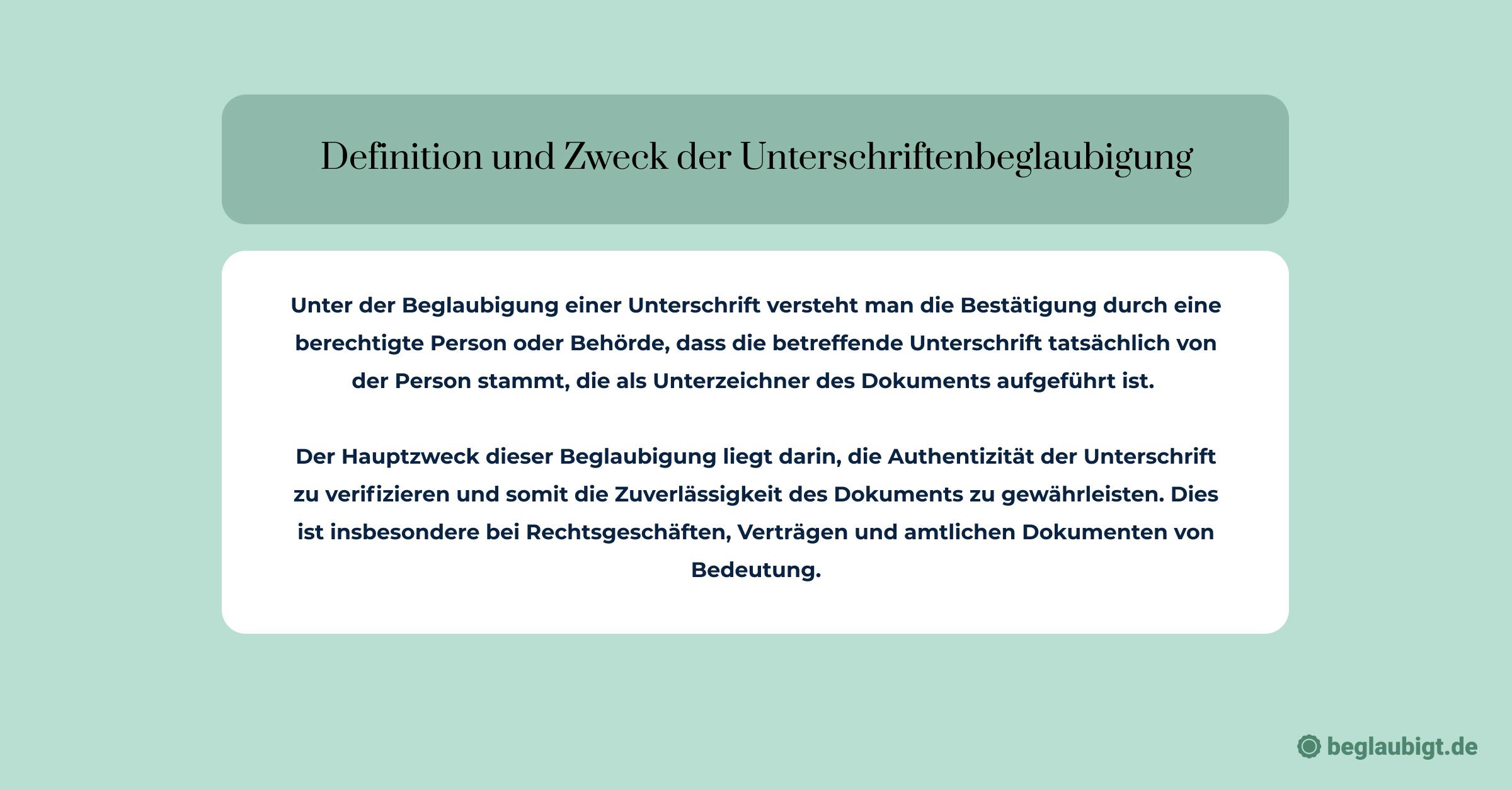Who is authorized to perform official certification in Germany?
In Germany, the authority to officially certify signatures is clearly regulated in order to ensure the authenticity and legal validity of documents and contracts. This section provides a comprehensive overview of the institutions and individuals authorized to perform official certifications in Germany and highlights the legal basis governing their powers.
Overview of eligible institutions and persons
The main parties authorized to officially certify signatures in Germany are:
- Notaries: They play a central role in certifying signatures and documents. Their powers extend to certifying signatures, transcripts, copies, and other documents. Notaries guarantee the authenticity of the signature and the identity of the signatory through their official certification.
- Authorities: Various authorities are also authorized to certify signatures and documents, but within a more limited scope. Their responsibilities vary depending on the type of document and the specific administrative area. For example, registry offices can certify birth certificates, while the residents' registration office can certify registrations or changes of address.
Legal basis for certification authority
The legal basis governing the powers of certification in Germany are, in particular:
German Civil Code (BGB): The BGB contains provisions on the form of legal transactions, including the need for notarization in certain cases.
Administrative Procedure Act (VwVfG): The VwVfG regulates the certification of documents and signatures in the area of public administration. It specifies which authorities may certify documents and under what circumstances.
Special cases: universities, churches, and chambers of commerce and industry
In addition to notaries and public authorities, there are also special institutions that are authorized to perform certifications in certain contexts:
- Universities can certify diplomas and other academic documents, for example.
- Churches offer certification for church documents.
- Chambers of Industry and Commerce (IHK) are authorized to certify certain business-related documents.
These specialized institutions and bodies ensure that there is a competent and authorized authority for almost every certification requirement. The clear allocation of certification powers guarantees legal certainty in Germany and strengthens confidence in the authenticity and validity of certified documents and signatures.
If you would like to use one of our partner notaries from beglaubigt.de, please feel free to contact us at any time Contact - you can also find out more about our satisfied customers

How can I have a signature certified?
The certification of a signature is a formal process that confirms the authenticity of a signature. This process is crucial for the validity of various documents. But how is a signature actually certified, and what steps are necessary to do so?
Definition and purpose of signature certification
The certification of a signature refers to the confirmation by an authorized person or authority that the signature in question actually originates from the person listed as the signatory of the document. The main purpose of this certification is to verify the authenticity of the signature and thus ensure the reliability of the document. This is particularly important in legal transactions, contracts, and official documents.

Step-by-step guide to certifying a signature
- Gather the necessary documents: First, you must have all the necessary documents that need to be certified, as well as valid photo ID for identification purposes.
- Application procedure: Contact an authorized body, such as a notary or public authority, to arrange an appointment for certification. You must attend this appointment in person so that your identity can be verified and your signature certified.
- Differences between simple and official certification: It is important to understand that there are two types of certification. Simple certification merely confirms the authenticity of the signature, while official certification also certifies that the copy matches the original document. The choice between these two forms depends on the intended use of the document.
Examples of when a certified signature is required
- Contracts: For many types of contracts, especially in the real estate sector or for contracts that must be notarized, a certified signature is required to ensure the validity of the contract.
- Official documents: When submitting certain documents to authorities—such as birth certificates, marriage certificates, or even registration of residence—a certified signature is often required.
These steps and examples illustrate how a signature can be certified and when this process is necessary. By following the procedures outlined above, you can ensure that your documents receive the formal recognition they need to be legally valid.
If you would like to learn more about certifying signatures, you may also find this article interesting: Certifying signatures
Who will verify my signature?
The certification of a signature is a formal process that confirms that the signature is authentic and actually originates from the person who signed it. In Germany, there are specific institutions and individuals who can perform this important task.
This section explains who is responsible for certifying signatures, what role notaries play in this process, and how official bodies are involved in the case of special documents. It also discusses restrictions and exceptions relating to signature certification.
Notaries and their role in certification
Notaries are legally trained individuals appointed by the state judicial administration to act in the public interest. They play a central role in certifying signatures. Their main task in this context is to verify the identity of the signatory and confirm that the signature was made in their presence. Notaries are responsible for a wide range of documents, including contracts, powers of attorney, and declarations of all kinds.
Official agencies for special documents
In addition to notaries, there are also special official bodies responsible for certifying certain documents. These bodies include, in particular:
- Registry offices: They are responsible for certifying civil status documents such as birth, marriage, and death certificates. Registry offices can certify copies of these documents to confirm that they match the original.
- Immigration authorities: These authorities are responsible for certifying documents that are relevant to residence matters and naturalization procedures. These may include foreign documents that are required for applying for a residence permit or for naturalization.
Restrictions and exceptions for signature certification
There are certain restrictions and exceptions that must be observed when it comes to certifying signatures. Not all documents can or may be certified by every authority. For example, notarial certifications may not be used for public documents that have been issued by an authority and already bear an official seal. Similarly, there are documents that require a special form of certification, such as apostilled documents for international use.
It should also be noted that some authorities are only permitted to certify copies and not signatures. The exact powers and restrictions vary depending on the institution and type of document, which is why it is important to find out in advance which authority is responsible for certifying a particular document or signature.
Knowing who is responsible for certifying signatures in Germany greatly simplifies the process of preparing and submitting documents. By complying with the prescribed procedures and understanding the responsibilities of the various institutions, the validity and legal binding force of documents can be ensured.
Would you like to learn more about notaries and their duties? Then take a look at this article: The role of notaries in Germany
Where can I get a certified signature?
The search for a reliable source for certifying a signature can vary depending on the type of document and specific requirements. In Germany, there are several places that offer this service, from traditional notaries to modern online platforms. This section explains the various options and their respective processes, costs, and processing times in detail.
1. Notary offices: Services and accessibility
Notaries are the traditional and one of the most reliable points of contact for the certification of signatures and documents. Notaries offer a wide range of services, including the certification of signatures, the notarization of contracts, and the drafting of powers of attorney. Notary offices are accessible throughout Germany, although appointments must generally be made in advance. The costs for notarial certifications are regulated by law and may vary depending on the type and scope of the service.
2. Public administrative bodies: options and procedures
In addition to notaries, public administrative offices can also perform certain certifications. These include city and municipal administrations, which may be responsible for certifying copies and, in certain cases, signatures. The certification process at public administrative offices is usually straightforward, but it usually requires you to show up in person with the original document and valid ID. The costs are often lower than at notary offices and are determined by local fee schedules.
3. Alternative ways of certification
For special documents or in specific situations, alternative methods of certification may also be considered. Universities, churches, and certain professional associations may certify their own documents under certain circumstances. It is advisable to contact the respective institution directly to inquire about the possibility and conditions for certification.
4. Online platforms and services such as beglaubigt.de
In recent years, online platforms and services offering certification have gained popularity. Websites such as beglaubigt.de enable users to initiate the certification process digitally. Although the actual certification of the signature must still be carried out in the physical presence of an authorized person, these services simplify the appointment process and provide advance information on the required documents and costs. Some platforms also offer additional services such as translations or apostille certification for international use.

You can find more information on this topic here: What is online certification?
Costs and processing times
The costs for certifying signatures vary depending on the provider, type of document, and scope of service. Notaries base their fees on the fee schedule for notaries, while public administrative offices have their own rates. Online services may charge additional service fees. Processing times also vary and depend on the workload of the selected office and the specific service. It is advisable to find out in advance about the expected costs and processing times in order to avoid delays and unexpected expenses.
Overall, the German market offers a wide range of options for certifying signatures, making it possible to find the right solution for individual needs and preferences.
If you would like to use the services of beglaubigt.de and make an online notary appointment, please send us a request with the details.
What are the requirements for notarization?
The notarization of signatures and documents is a formal process that confirms the authenticity of a signature and the identity of the signatory. Certain requirements must be met in order to obtain such certification. These serve to ensure the legal validity and authenticity of the certified documents and to protect both the interests of the signatory and legal requirements.
- Personal appearance: One of the basic requirements for notarization is that the signatory appear in person before the notary. This allows the notary to verify the identity of the person by means of an official photo ID (e.g., identity card or passport). The signature must be made or acknowledged in the presence of the notary to ensure its authenticity.
- Submission of the document: The document to be certified must be submitted in its original form if it concerns the certification of a signature. When certifying copies, the original document must also be submitted so that the notary can certify that the copy matches the original.
- Clarity and completeness of the document: The document to be certified must be clear and complete. Incomplete documents or those containing obvious errors may be rejected by a notary. It is important that all information in the document is correct and satisfactory to the notary in order to avoid misunderstandings or legal problems.
- No obvious legal defects: The notary checks the document for obvious legal defects or contradictions. If the document gives cause for concern or violates applicable law, the notary may refuse to certify it. The role of the notary also includes a certain legal advisory function to ensure that the certified documents comply with legal requirements.
- Payment of fees: Notarization fees are charged in accordance with the schedule of fees for notaries. These fees must be paid in advance or immediately after the service has been provided. The amount of the fee may vary depending on the type and scope of the notarization.

Compliance with these requirements is crucial for the validity of the notarial certification. They serve to ensure the integrity of the certification process and to strengthen confidence in the authenticity and legal validity of the certified documents.
Looking for a notary appointment near you?
When is it advisable to have a document certified by a notary?
A notarization by a notary public is useful in various situations and is sometimes even required by law. The process of notarization provides official confirmation that a signature is genuine and was made by the person who signed it. This is particularly important in cases where the authenticity of a signature or document can have legal or financial consequences. Here are some key situations in which notarization is recommended or required:
Contracts and legal transactions
- Real estate purchase agreements: In Germany, notarization of real estate purchase agreements is required by law. This is intended to increase legal certainty for all parties involved and ensure that the agreement complies with legal requirements.
- Formation of companies: The signing of articles of association, particularly when forming limited liability companies (GmbHs) or stock corporations (Aktiengesellschaften), requires notarization. The notary verifies the identity of the founding members and confirms compliance with legal requirements.
Powers of attorney and declarations
- General and precautionary powers of attorney: Notarization is often recommended for powers of attorney that are to remain valid even in the event of legal incapacity. This ensures clarity regarding the authenticity of the power of attorney and the intention of the person granting it.
- Inheritance matters: In many cases, the opening of wills and inheritance contracts require notarization to ensure their validity and enforceability.
Official documents and certificates
- Applications for land registry entries: Notarization of the signatures on the application is required for the registration of property transfers, mortgages, or other land registry-related transactions.
- Certification of copies: If official documents must be submitted in certified form, notaries can perform these certifications. This is the case, for example, when applying for public office or submitting documents to authorities.
International documents
- Apostilles and legalizations: For the international use of German documents, notarization and subsequent apostille or legalization may be required to confirm the authenticity of the document abroad.
The necessity of notarization therefore arises from the significance of the document or transaction and the legal requirements. The use of notarial services ensures legal certainty, prevents misunderstandings, and protects against fraud. If you have any legal questions or uncertainties regarding the necessity of notarization, it is always advisable to consult a notary or legal advisor directly.
If you would like to learn more about this topic, you may also be interested in the following article: Why a notary is essential when purchasing real estate.
Conclusion: Who can certify a signature?
The topic of signature certification is an essential part of everyday legal practice in Germany and plays a crucial role in maintaining legal certainty and trust in official documents and contracts. As we have seen, signature certification is not merely a bureaucratic act, but a fundamental process that confirms the authenticity and validity of documents, thereby forming the basis for numerous legal and business transactions.
In summary, notaries, public authorities, and certain institutions are authorized to officially certify signatures in Germany. Each of these bodies plays a specific role in the certification process, depending on the type of document and the purpose of the certification. While notaries play a central role in certifying signatures and documents for private and business matters, public authorities are often responsible for specific official documents. In addition, modern solutions such as online platforms offer additional options for completing certifications quickly and easily.





